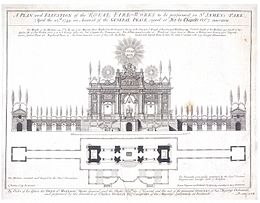Giovanni Niccolò Servandoni

Jean-Nicolas Servan, also known as Giovanni Niccolò Servando or Servandoni (2 May 1695 – 19 January 1766) was a French decorator, architect, scene-painter and trompe-l'œil specialist.
He was the son of a carriage-builder at Lyon. Francesco Milizia claims Giovanni Girolamo Servandoni was born in Florence.
He was educated as an artist in Rome, but moved to Paris in 1724, where he became director of decorations ( 1724 to 1742 ) at the Paris Opera, at that time situated in the Théâtre du Palais-Royal. He became a member of the Académie Royale de Peinture et de Sculpture in 1731. His activity was considerable, whether as a painter or as an inventor of scenic contrivances for fêtes at the marriage of royal personages. He decorated public festivals in England, France, and Portugal.

During the years 1738–1743 and 1754–1758, Servandoni produced a series of successful theatrical productions much in the style of seventeenth-century machine plays, with an emphasis on elaborate changes in décor and special effects, often set to music.[1] Unlike the machine plays of the seventeenth century, Servandoni's productions used pantomime rather than dialog, with a description of the story provided in the program. His productions were typically based on well-known stories from literature and mythology such as the Spectacle de Pandore ('1739) which told the tale of Prometheus and Pandora or "La forêt enchantée" (1754) which was inspired by Torquato Tasso's "Jerusalem Delivered".

He also designed the decorations for altars, and the façade for the church of Saint Sulpice in Paris. He died in Paris in the early 1766.
His writings include:
- Description abregée de l'eglise Saint Pierre de Rome (Paris, 1738)
- La Relation de la répresentation de la forêt enchantée sur le théâtre des Tuileries, le 31 mars 1754.
References
Notes
- ^ Olivier, Marc (2005). "Jean-Nicolas Servandoni's Spectacles of Nature and Technology". French Forum. 30 (2).
Sources
- This article incorporates text from a publication now in the public domain: Chisholm, Hugh, ed. (1911). Encyclopædia Britannica (11th ed.). Cambridge University Press.
{{cite encyclopedia}}: Missing or empty|title=(help) - Milizia, Francesco (1797). Dizionario delle Belle Arti del Disegno y Estratto in Gran Parte dalla Enciclopedia Metodica da Francesco Milizia, Seconda Edizione, Tomo Secondo. Bassano, Italy;. p. 172.
{{cite book}}: CS1 maint: extra punctuation (link) - Olivier, Marc (2005). "Jean-Nicolas Servandoni's Spectacles of Nature and Technology". French Forum. 30 (2).
External links
 Media related to Giovanni Niccolo Servandoni at Wikimedia Commons
Media related to Giovanni Niccolo Servandoni at Wikimedia Commons
